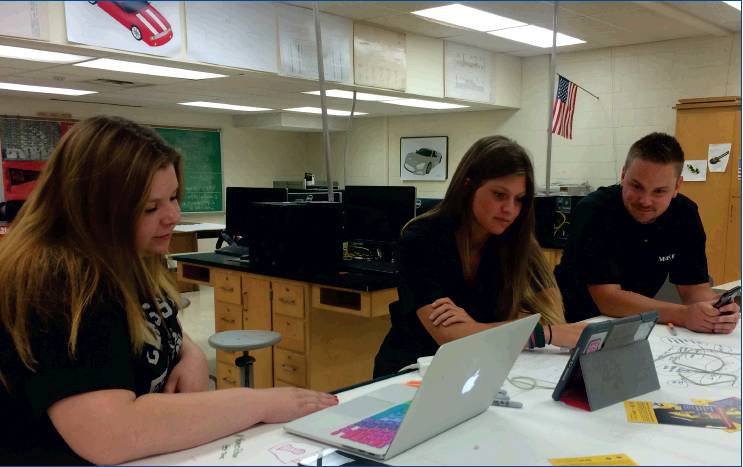Fab Institute technology central at Elizabeth Forward High School
The four-day event to promote the maker movement attracted more than 130 educators from 12 states.
By JOSE NEGRON jnegron@yourmvi.com
The Elizabeth Forward School District has embraced the maker movement and the use of technology in the classroom.
Because of that, the district is sponsoring the third annual Pittsburgh Fab Institute this week at the high school. The four-day event will run through today.
More than 130 elementary and secondary educators from 12 states are attending the free event, which consists of three-hour training sessions in maker spaces and Fab Labs.
Money for the event comes from RemakeLearning.org through the Grable Foundation in Pittsburgh.
“Part of Remake Learning is about thinking differently about learning,” said Dr. Todd Keruskin, Elizabeth Forward assistant superintendent.
Keruskin said the goal is to promote innovation and creativity in the classroom.
“Teachers struggle with that, from what machines to buy, what the lessons are and what the curriculum looks like,” Keruskin said.
He said the district is trying to teach students about creativity, design and innovation, and teaching teachers about digital fabrication tools.
“What we see is, when we are teaching this, kids are learning problem-solving skills and they are learning to collaborate with one another,” Keruskin said. “It’s almost teaching what is called a growth mindset that ‘I can accomplish anything if I put my mind to it,’ and that is really the maker movement.”
During Tuesday’s event, sessions touched on topics such as digital fabrication and sublimation, through which students learned to use Adobe Illustrator and printing out photos with special paper.
Students used heat press machines to transfer photos onto items such as mugs, mouse pads and water bottles. Keruskin said students from kindergarten to fifth grade can be involved with learning sublimation.
In another classroom, educators explored coding, using language systems computers can understand.
Cathy Coudriet, a Fab Lab staffer from the Carnegie Science Center in Pittsburgh, said participants took part in the “Sphero Chariot Challenge.”
It involved a scenario in which an atomic power plant melts down and nuclear waste has to be transferred to a waste site.
By using iPhones and iPads to code a Sphero robot, they used foam, laser-cutting technology and dowel rods to come up with a solution.
“It teaches them how to use Ink-scape, which is an online design program,” Coudriet said of the laser cutter program. “It’s a free program, and it’s for two-dimensional design.”
Coudriet said the activity teaches students how to use various programming methods.
Educators had opportunities to test their leadership skills in an escape room designed by members of a girls’ maker class at the high school.
With the help of graphic technology and assistance from digital media teacher Megan Smith and eighth-grade history teacher Jourdan Englert, several girls designed the room and a scenario to enhance teamwork and problem-solving skills. “We had to go through a lot of brainstorming on this,” 2017 grad Avari Reed said.
The scenario involves Keruskin losing a flash drive needed for a presentation.
The group that enters the room has one hour to solve a list of puzzles involving math and geography to escape. They are able to ask for hints from students on the outside via iPad. “Our escape room has promoted team building, confidence in our students and communication,” Smith said. “ ... We’re trying to give educators a fun way to deliver content to their students.”
Englert said the escape room idea came from a conference he and Smith attended in San Diego.
“It gets the kids thinking, to come up with creative solutions,” said Jeff Stolkovich, a high school technical department staffer.
The event included low-tech teaching.
Dave Vuick, a Greensburg Salem High School technical education teacher, led a problem-solving session that involved making a claw out of wood.
“The outcomes were all different,” he said. “I had three groups and they didn’t copy anyone else’s. I learned that adults think so much differently than students.”
Technical education teachers Mitch Palucis of Fox Chapel and Steve Stroyne of Upper St. Clair led a session on how a Computer Numerical Control machine can be used in a school environment to perform two- and three-dimensional work.
“You can make anything,” Palucis said. “It’s used a lot in the furniture-making industry because of the repeatability of it.
“The kids pick it up really simply, and they come up with really good ideas.”
Keruskin said companies like Uber and Amazon depend on technology, adding schools must follow suit.
“If you think about the Tesla car that is all electric powered, that’s our world and we need to start teaching innovation and creativity to kids,” he said.
Elizabeth Forward has sponsored the event the last three years.
“To be able to help other schools, I’m proud of our district and our community for what we have done,” Keruskin said. “For four days, to be able to give back to schools across the country, it’s been very powerful.”
Keruskin said professional development for educators continues long after the event is over each day.
“We had dinner last night, and they were still here making, designing and learning,” he said. “That is pretty incredible.”
Since 2015, the Pittsburgh Fab Institute event at Elizabeth Forward has grown from 70 educators to nearly double that amount.
“We need to put our heads together after this week and try to figure out how to make this grow and how to make it more innovative,” Keruskin said.
“We don’t want to do the same things we have done over the last three years.”
